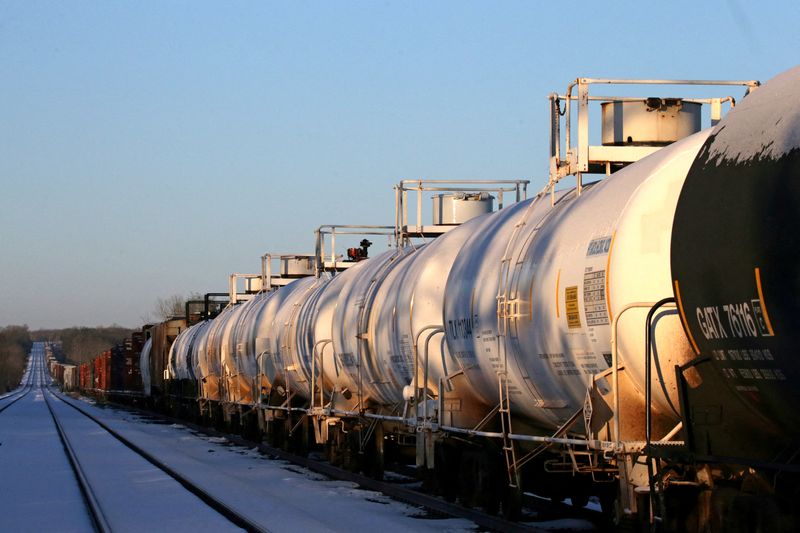Factbox-Key facts about Canada’s biggest rail operators as work stoppage begins
2024.08.22 12:06
OTTAWA (Reuters) -Canada is seeing an unprecedented simultaneous stoppage at its two main freight rail operators that could inflict billions of dollars worth of economic damage.
The two rail operators, Canadian National Railway (TSX:) and Canadian Pacific (NYSE:) Kansas City, are holding separate talks with the Teamsters’ union, which represents more than 9,000 workers including locomotive engineers, conductors, train and yard workers and rail traffic controllers.
The companies locked out workers on Thursday after failing to reach a labor deal.
Here are a few key facts about the two rail operators:
HISTORICAL BACKGROUND
CN Rail’s history dates back to the 1830s, but it was only officially incorporated in 1919. Headquartered in Montreal, the company was government-owned until it was taken public in 1995. Through its acquisitions of Illinois Central Corp and Wisconsin Central in the late 1990s and early 2000s, CN expanded its rail network across the Great Lakes region and down to the Gulf of Mexico.
CPKC’s history dates back to the 1880s. Previously known as CP Rail, it was built to connect Canada from coast-to-coast. CP Rail was once involved in several businesses including mining and hospitality, and it built and owned iconic Canadian properties such as the Banff Springs Hotel, the Royal York in Toronto, and Château Frontenac in Quebec City.
Calgary-headquartered CP Rail spun-out its other businesses in 2001. It bought Kansas City Southern (NYSE:) Railway in 2021, and became CPKC, forming the first single-line rail connecting the U.S., Mexico and Canada.
RAIL NETWORKS
Although some U.S. rail operators do have small branch lines that enter Canada, CN Rail and CPKC hold a duopoly and are the two dominant freight rail operators in the country. With coast-to-coast networks, the duo account for the vast majority of all rail transport industry revenues in the country, own more than 75% of all tracks, and account for roughly three-quarters of the overall tonnage carried by the rail sector in Canada.
For Canada, the two operators serve as important supply chain links to trade corridors and ports across the continent of North America.
CN Rail, which employs around 25,000 people, has a network that stretches from Vancouver to Halifax in Canada, and all the way down to New Orleans.
CPKC, which has roughly 20,000 employees, has a network that runs from Vancouver to Montreal. It also links to the ports of Corpus Christi, New Orleans and Gulfport in the Gulf of Mexico, and further south it connects to the ports of Tampico and Lázaro Cárdenas on the east and west coasts of Mexico.
REVENUE MIX
In 2023, 25% of CN Rail’s freight revenue came from grain, fertilizers and coal; metals, minerals and forest products were 24% of its revenue mix; and petroleum products, chemicals, autos and intermodal container cargoes accounted for the remainder.
In 2023, 35% of CPKC’s freight revenue came from shipments of coal, grain, potash and fertilizers. Forest products, energy, chemicals, metals and autos accounted for 45% of its revenue mix, with the remainder coming from intermodal container cargo.
PRIOR WORK STOPPAGES
In 2019, about 3,200 unionized workers of CN Rail, including conductors and yardmen, went on an eight-day strike in Canada. That strike led to heating fuel shortages, large backlogs and a slowdown in industrial output from plants making goods ranging from chemicals to canola oil.

In 2018, a day-long strike ended after the Teamsters and CP Rail struck a four-year contract. And in 2015, CP Rail and the Teamsters agreed to seek mediated arbitration, ending another short-lived strike.
In 2012, about 4,800 locomotive engineers, conductors and yardmen of CP Rail went on over a week-long strike that only ended after the government introduced back-to-work legislation, at a time when the economy was still recovering from the global financial crisis and a recession.








